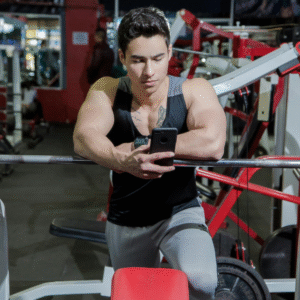17-year-old Elias discusses the impact of social media on young men trying to get fit, and where the lines need to be drawn

‘Social media can create unhealthy pressure on young people to push themselves before they are developmentally ready.’
Picture by: Sabel Blanco | Pexels
Article link copied.
September 19, 2025
Finding balance with fitness and social media

Every day, millions of boys and young men scroll through Instagram and TikTok, envying influencers in their seemingly perfect lives who have the toned, fit body that they are after. Whether they are flexing their muscles in the mirror or taking us through their day, these influencers are inspiring us to get fit, get on the ‘grind’, and look a particular way.
For some people, this is beneficial as it provides encouragement. Rufus Smith, a 17-year old from England, says, “It’s not as much pressure as it is motivation, something to aspire to, not something that you have to be.”
Harbingers’ Weekly Brief
On the flip side, social media can create unhealthy pressure on young people to push themselves before they are developmentally ready. Studies say that children as young as seven can start simple strength training, but they need to be older – around 14 – to start serious weight training.
For others, social media has little effect, especially with experience and age bringing greater knowledge and maturity.
Joe Robinson, 28, a PhD student at Cambridge and an avid gymgoer, says: “I know that social media isn’t real life. Even if influencers aren’t on any special ‘sauce’ [steroids], they’re photographed in the best possible lighting and with a pump. Recognising that 100% of what we see is only about 2% of reality is a powerful thing.”
Supplements
Beyond workout routines, another trend heavily shaped by social media is the growing obsession with supplements. Protein powders, pre-workouts, creatine and other supplements have become part of many people’s daily routines and it is spreading to younger audiences. What once belonged mostly to professional athletes is now marketed as an essential for anyone looking to enhance their performance or increase their gains.
Influencers often promote what they claim to be the most effective products and supplements to achieve fitness goals.
Increasingly, many of them also have their own fitness brands. Sometimes they are sponsored by companies or are a part of affiliate marketing schemes and are making money via their promotions. Or, they could simply be making claims based on their personal preference.
Rufus Smith told Harbingers’ Magazine, “It made me know the right ones to take and the ones to avoid and then give advice to other people. I ignore all the influencers’ own-brand supplements, but I listen to their advice on trusted brands.”
The risk with own-brand supplements is that they don’t have the same track record as well-known and respected brands. Quality can vary, and there may be little scientific evidence to support the claims made. This uncertainty is especially concerning when such products are marketed heavily to younger people through social media.
Joe Robinson says, “I do think that influencers should be subject to more robust accountability mechanisms when they peddle ‘snake oil’, because young men in particular want to look the way their idols do and they’re willing to take anything to do it.”
#fitness
Statistics show that 180 out of 400 million Instagram users displayed the hashtag ‘#fitness’ in 2021. Around 50 million videos on TikTok used the hashtag ‘#fitness’.
But this abundance comes with risk. As Joe Robinson puts it, “Social media is still infected by the scourge of influencers propounding nonsense novelty exercises to generate clicks and engagement.”
Not everyone is influenced in this way. When asked how social media has shaped the way he works out, Rufus Smith says, “I don’t listen to social media advice at all. I prefer to do proper research and speak to the experts – gym coaches – at my school.”
Social media can be a powerful tool and while it can be extremely useful in finding new exercises and workout plans, one should always tread carefully and use it as a resource rather than as a manual for how to live your life.
In the end, everyone is different and we all require different amounts and types of training and supplements to achieve our physical goals. Seek trustworthy guidance and focus on what truly works for you – rather than chasing whatever is trending online.
Written by:

Writer
Bali, Indonesia
Born in 2007 in Malmo, Elias has studied in Sweden, Chile, California, North Carolina, and Bali. He is interested in business, entrepreneurship, management and international relations and plans to study along those lines. For Harbingers’ Magazine, he writes about economics, society, international relations, and sports.
In his free time, Elias plays football, does Maui Thai, goes to the gym, enjoys riding motorbikes and spending quality time with friends and family. He has played high level football his entire life and runs a microbusiness teaching football to young athletes.
Elias speaks English and Swedish.
Edited by:

🌍 Join the World's Youngest Newsroom—Create a Free Account
Sign up to save your favourite articles, get personalised recommendations, and stay informed about stories that Gen Z worldwide actually care about. Plus, subscribe to our newsletter for the latest stories delivered straight to your inbox. 📲
© 2025 The Oxford School for the Future of Journalism


